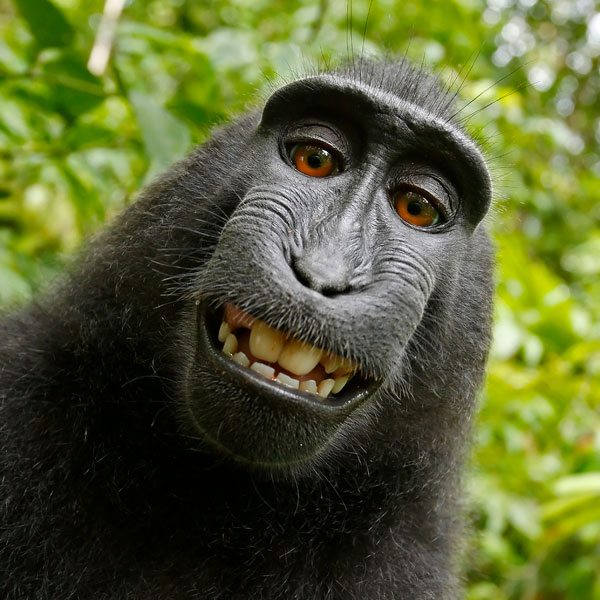
September 11, 2017; New York Times
NPQ has long said that PETA is a nonprofit to watch in terms of being actively opportunistic about public education. The organization is a master in that domain, and here’s an example.
Humankind is slowly warming to the idea that other beings are endowed with sentience and should, sharing that gift with us, be accorded similar dignities and rights to those that, in theory, people have. That emerging philosophical shift is what is driving this copyright case.
Naruto, the crested macaque monkey who lives in the Tangkoko Reserve on the Indonesian island of Sulawesi with other members of this critically endangered species, has “agreed”—the nonprofit People for the Ethical Treatment of Animals (PETA) actually sued on the monkey’s behalf—to an important settlement in a complex copyright lawsuit that may have profound impact on animal rights practices and cases internationally. No banana jokes here. That would be a slippery slope. No monkey business either, as that would depart from the far-reaching gravitas of this recent development in copyright law proceedings. This is ultimately a serious human interest story.
Naruto’s case swung on the fact that the monkey cavalierly pressed the button of a camera set up nearby by photographer David J. Slater. (You might say the subject of the photograph was naturally selected.) Slater, the defendant in this suit, agreed with PETA that the erstwhile photographer would keep the rights to Naruto’s work and would donate 25 percent of the future monetization of the photograph to nonprofits that provide aid and comfort to Naruto and similar simians. Slater has not provided any numbers of his earnings to date from Naruto’s first bold attempt to make a name in the visual arts world. The parties asked the Ninth Circuit Court of Appeals to drop Naruto’s suit and vacate the lower court’s ruling denigrating Naruto’s rights of ownership to the intellectual property.
Sign up for our free newsletters
Subscribe to NPQ's newsletters to have our top stories delivered directly to your inbox.
By signing up, you agree to our privacy policy and terms of use, and to receive messages from NPQ and our partners.
You may have seen the iconic selfie Naruto took in 2011 at the precocious age of 6, at the dawn of the worldwide selfie epidemic: the wide mercurial grin showing Bugs Bunny buck teeth, staring at the camera alertly yet with cool, sanguine awareness, large orange wide-opened eyes of pure artistic intent and curiosity, well-groomed with short and wiry black hair, sans haberdashery yet with modest poise.
Though the federal court concluded that copyright laws only inure to the benefit of the human species, Naruto/PETA’s settlement is potentially a huge victory for animals and advocates, a toehold toward more full rights for animals, or at least higher order animals as judged from a homocentric perspective.
PETA general counsel Jeff Kerr expressed satisfaction that the fruits of the labor would accrue to Naruto, stating that, “The dire need of Naruto is what fully underpins why we pursued this lawsuit to begin with. We wanted every bit of all of the proceeds to benefit Naruto.”
This settlement is a significant transformation of the legal landscape. Advocates and detractors must ask themselves what long-range transformations this settlement may engender. Will this partial victory for Naruto open up a can of sock monkeys, leading to legal victories and monetary rewards for animals in a wide swath of scenarios? Will animal experiment subjects profit from sales of the products they help develop, and a priori, will they be able to sue for negligence or willful malfeasance to their persons for the harm they endure in service to so-called human progress?
Would Curious George be entitled to book and visual media royalties from the Rey estate, and will future Planet of the Apes sequels be impossibly expensive to produce? Will there be universal healthcare for animals, or at least pet-icare for dogs nine years and older? Will hermit crabs have to pay property taxes on the cubic inches of their pebble and fake-starfish strewn tanks? Will the next of kin of cows and chickens be able to sue McDonalds and Perdue? Will songbirds perform on America’s Got Talent? Will ten monkeys typing be able to follow up to this newswire?—Louis Altman










